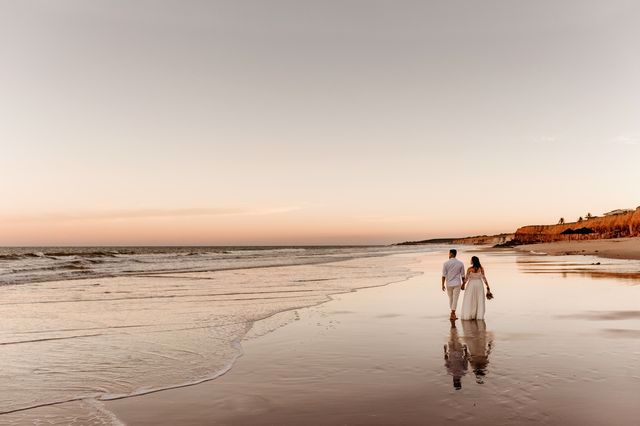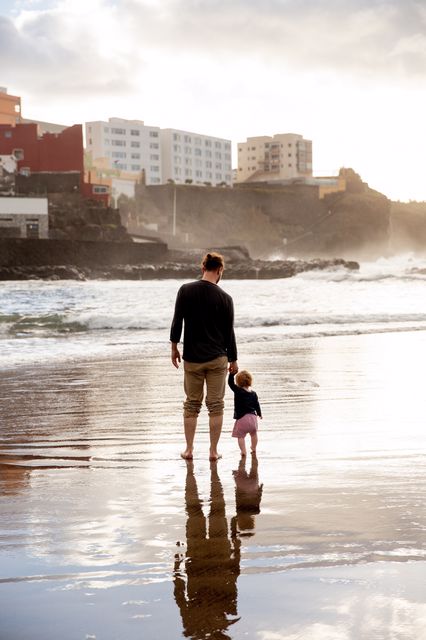I have a theory that the soul of every person has a setting where it feels at home.
For some this place is this mountains or the desert, while for others it might be a lake or a river. All of these places have a powerful attraction to different types of souls. Many people have written about insights and inspirations they have received from being in these places. But even without some kind of life-altering experience, people go to these places and feel contentment, peace, and rest.
I’ve often wondered what it is about these places that contribute to these experiences and these feelings. I had a chance a few years ago to do some of that wondering with a client in therapy. The “at home” place for his soul was the beach. The following reflections are based on my conversations with him about the beach and its meaning for him. They are shared with his permission.
There are many kinds of rituals that take place at the beach. It is probably not too far off base to suggest that these rituals, like many other rituals, are religious or sacred in nature. There is the building of sand castles or digging into the wet sand. There is the looking for seashells or listening to the sound of the waves. All of these activities happen with great regularity. And yet, if you asked, people would have great difficulty explaining their appeal. But all of them would admit that they create a deep sense of pleasure.
One feature that all of these rituals have in common is their non-productive, almost useless, nature. You don’t really get anything accomplished. There is no goal or outcome in mind. You just do them, and feel extreme satisfaction in the doing of them, not in what they produce.

Another beach ritual that is almost universal is the practice of going to the edge of the water and walking up and down the beach.
Sit at the beach for a few hours. During that time, there will never be a moment when you don’t see someone walking along the beach. Individuals and groups. Children and adults of all ages, along with their pets. Like all the other beach rituals, it is a non-productive activity. These people are not walking to or away from anything. They are not getting their daily exercise or stretching their legs. They are just walking. It is this particular beach activity on which my client and I reflected. We wondered together about the meaning behind this sacred ritual.
First of all, we noticed that everyone walks along the shoreline. They walk on the wet sand, close enough to the water to let the waves wash up on their feet. No one walks in the middle of the beach. No one walks knee-deep, or even ankle-deep, in the water. This beach ritual happens in a liminal space. An in-between space. It is a place in-between two worlds.
On one side is the land. It begins with the beach and moves to the grasslands at the edge of the sand. From there it stretches to the houses, the cities, the prairies, and the mountains inland. On the other side is the ocean. It begins with the shallows where people splash and swim. It moves on to boats and off-shore oil platforms in the distance. From there it stretches out to the horizon. As you walk along the beach, you live on the edge of two very different worlds. You are part of each of them but not completely immersed in either of them.
It is in this liminal space that you are able to consider each of these worlds and what they have to offer.
First, there is the land.
The first thing you realize about the land is that it is your home. It is on the land that you live out your life. It is on the land that you do and be all the events, and non-events, that make up your story. There are parts of that story about which you are excited and which you embrace deeply. There are other parts of that story which you would like to change or re-author in some way.
The land is not only where you live your life; in many ways, it is your life. It is the place where you go to work every day and come home to your family. It is the place of interruptions and distractions. It is the place where you are hungry and find nourishment. It is the place with moments of vibrant joy and deep disappointment.
But mostly it is the place with moments of the ordinary and the everyday. While it is a place for the unexpected, for the most part, it is not a place filled with wonder and mystery. It seems like you can go for days without using your imagination, since everything seems to happen much as you expected. Or exactly like you planned.
And it can be difficult to see the depth of meaning, or the absence of meaning, while you are there in the midst of them, living them out on the land. It is only in the in-between space of your walk along the shore that all of these meanings are seen more clearly. In fact, that may be the very reason you are walking in that space. “Where are you going this weekend?” a friend asks. And our reply goes something like this and says something very important, “Well, I’m going to get away to the beach.”
Then there is the ocean.
The wild and mysterious ocean. When you look out on it, it seems simple, almost boring, continuous and unbroken sheet of water. And yet, although you cannot see it with your eyes, with your imagination, you know that it is teeming with a rich variety of life.
You know that it has a power that is beyond anything you could possibly imagine, much less harness and use in some way. You float playfully along its waves, yet you know that you are at its mercy. For the most part that mercy is gracious and benevolent, but you know that there are ways it can take control and carry you wherever it wants you to go. I guess when you think about it long enough, you realize that this ocean-world is a lot like God. And this realization comes to you in a strange and powerful way when you are standing in this liminal place between these two worlds.

The ociean is not your home. You know that you cannot live in the ocean. For a time, you can be by the ocean, at the ocean, or even on the ocean, but you cannot live in the ocean. You can float on top of it, enjoying the gentle rocking of the waves. You can dive down into it and explore a small portion of its treasure for a period of time. But it is not your home. It is a vast and strange world that attracts you with its wildness and its mystery.
You look out to the horizon as far as your eyes can see. But you don’t stop there. You use the eyes of your imagination and wonder what is beyond the line where the water meets the sky. But you also realize that it is this in-between space along the shore that gives you the freedom, and the courage, to look out on and fantasize about its mysterious wildness.
You know that its vastness would overwhelm and terrify you if you were floating on a raft or in a boat out beyond the horizon, surrounded by nothing but water. You long for the adventures in the ocean that your imagination creates, and yet, at the same time, you are glad that your feet are planted firmly on the wet sand.
And so the ritual begins and so it continues.
You walk in this in-between space along the shore. You walk for miles and miles, hours and hours. You walk as long as you need to walk. And the whole time you are walking, you look at these two worlds. You look first at one and then at the other. You think about your place in one and then your place in the other. You wonder what each of these worlds has to offer you, what they can say to you.
You can’t look at both of them at the same time. In this liminal space, you can’t bring them together completely, in your sight or in your mind. At one moment and then another, each of them demands your full attention. But it is not an exercise in frustration or futility. You realize that there is something right and good about these two worlds living together side-by-side for these few moments. For it is in those moments that you can embrace fully what each of them has to offer you.
But eventually the walk is over and you return to your place on the beach. And when your time there is done, you do not pick up your things and stroll into the ocean. Instead, you turn the other way. You return to your car, your home, your family, your work, your world. That’s just the way it is. That’s just the way it has to be. And a part of you realizes that is just the way it should be.
But if you are open and honest, you can admit that something has changed.
That you have changed. After all, the writers also declare that this liminal space between the sacred and the mundane is also a place of transformation. And this transformation involves the way you decide to carry the other world, the ocean world, back with you.

This carrying, of course, involves more than the picture or postcard that you put on your desk or in your picture album and look at from time to time. Instead, this carrying, and the transformation that goes with it, involves the way you look for the ocean in the world to which you return. In the midst of all that is life, you use your imagination to discover, and live with, the wonder, the mystery, the adventure, the teeming life of the Ocean-World and the Ocean-God.
I think of the gospel story that describes fishermen working on the shore. Jesus calls to them, and they drop everything and go with him. Meeting the one who reveals God to us…in this liminal space. And following him into the world.

You’re amazing. Thank you.
Thanks Connie. Feel free to share with others. Hope you are well.